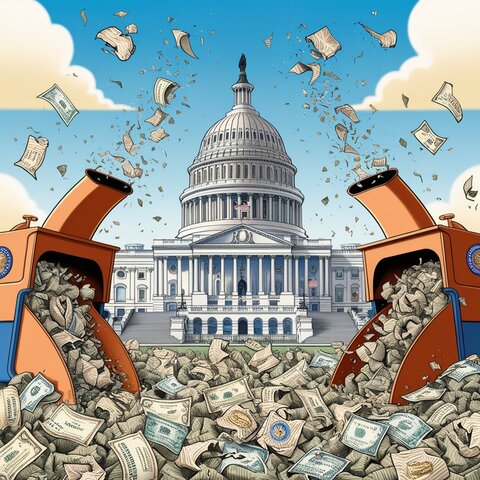Chris Edwards
Coming into office next year, Donald Trump will face massive budget deficits of $2 trillion a year and rising. Trump and every member of Congress now know that excessive deficits and spending can spike inflation, which is very unpopular with voters. The president and his budget team must find spending cuts to tackle the deficit monster.
However, Trump wants tax cuts, which would increase deficits. He also doesn’t want to cut Social Security or Medicare, and he may increase defense spending. Those are the three largest programs in the federal budget.
On the other hand, Trump has tasked Elon Musk with helping him cut federal spending, and there are many programs—even aside from the big three—that they should put on the chopping block:
K‑12 public school subsidies. President George W. Bush favored federal subsidies and top-down rules for the nation’s K‑12 schools. That approach failed, and Republicans now know that the future of K‑12 is state-driven school choice. The pandemic-era public school shutdowns bolstered the case for choice. The time is ripe to zero-out federal aid for public schools to save more than $30 billion a year.
Urban transit subsidies. Many urban rail systems attract few riders and cost far more than promised. Locally funded bus systems are a more efficient solution for moderate-income commuters. Trump should zero out $20 billion a year in federal subsidies for urban transit.
Foreign aid. The federal budget includes $47 billion for international aid programs in 2024. There is a lot of waste in foreign aid that should be cut. Poor countries grow their economies by market-based reforms, not by aid.
Green subsidies. The Inflation Reduction Act of 2022 is costing the budget about $100 billion a year in green energy tax breaks and subsidies. The expected cost of the bill has ballooned since it passed, and we are finding out that wind power, solar power, lithium batteries, and electric vehicles themselves cause environmental harm.
Broadband subsidies. The 2021 infrastructure bill added $65 billion in broadband subsidies, which came on top of more than $100 billion of broadband subsidies since the 1990s. New spending should be cancelled, as satellite internet service is now available everywhere.
Public housing and rental subsidies. The Department of Housing and Urban Development (HUD) hands out $55 billion a year for public housing and rental aid. This spending should be zeroed out, public housing should be privatized, and local governments should deregulate land use to spur private housing construction.
Community development grants. HUD hands out $21 billion a year to cities and counties for street projects, business subsides, arts facilities, and the like. These activities should be funded by local governments and the private sector.
Junk food subsidies. Trump partner Robert F. Kennedy Jr. favors cutting food stamp spending on junk food, which accounts for almost one-quarter of the $100 billion annual cost of the program. Junk food subsidies make no sense given America’s obesity crisis.
Farm subsidies for the rich. Trump and the Republicans generally support farm subsidies, but it should be politically feasible to cut aid to the wealthiest farmers. About 60 percent of the benefits from the three largest programs go to the top 10 percent of farms. Cuts would save billions of dollars a year.
Medicaid. This health program has grown explosively because the federal government subsidizes state program expansion in an uncontrolled manner. The government could save $300 billion a year within a decade by imposing a hard cap on aid to each state.
President-elect Trump says that Elon Musk will be in charge of cost-cutting, and Musk has talked about a new Department of Government Efficiency. But Musk seems to understand that we need program eliminations, not just efficiency, and he suggested a goal of $2 trillion in savings.
A key target for eliminations should be aid-to-state programs, such as K‑12 education, housing, and transit. Aid programs cost $1.1 trillion a year, and they are inherently inefficient and undemocratic because they impose costly regulations and top-down controls on the states. Federal aid should be phased out, allowing the states to design their own policies to match local preferences.
The Trump-Musk spending cut effort will, of course, face hurdles in Congress. The administration should focus on a handful of ripe targets, such as those listed here, and make a detailed argument for each cut. Trump should insist on eliminations in must-pass bills, such as the upcoming debt-limit in early 2025.
America risks a sustained economic crisis if we don’t cut federal spending. But cuts are also an opportunity to improve the nation’s governance and strengthen democracy by handing power back to the states. Furthermore, scrapping the top-down rules that come with federal programs would enhance diversity and expand freedom.
























